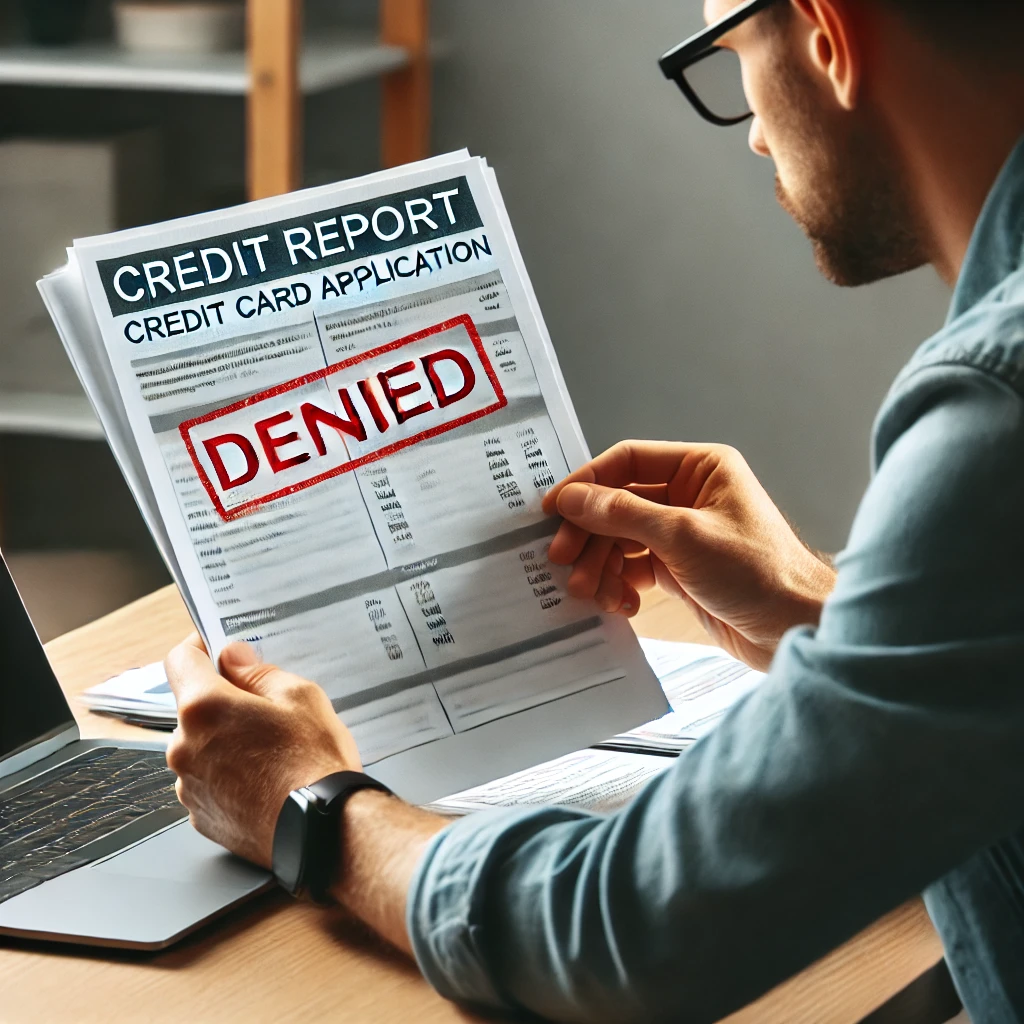
Receiving a denial for a credit card application can be disheartening, especially if you were counting on that new line of credit to manage your finances or build your credit history. However, a denial is not the end of the road. Understanding the reasons behind the denial and taking corrective action can help you improve your creditworthiness and increase your chances of approval in the future. In this article, we’ll explore the steps you should take after your credit card application is denied and how to turn this setback into a learning opportunity for your financial growth.
Understanding Why Your Credit Card Application Was Denied
The first step after a credit card application denial is to understand the reason behind the decision. Lenders are required by law to provide you with an explanation, usually in the form of an adverse action notice. This notice will list the specific reasons your application was denied, such as a low credit score, high debt-to-income ratio, or insufficient credit history.
Common reasons for credit card denial include:
- Low Credit Score: Lenders may deny your application if your credit score does not meet their minimum requirements.
- High Credit Utilization: If you’re using a large percentage of your available credit, lenders may view you as a higher risk.
- Too Many Recent Credit Inquiries: Multiple credit inquiries in a short period can signal to lenders that you are in financial trouble.
- Insufficient Income: Lenders may deny your application if your income is too low to support the credit limit you applied for.
- Limited or No Credit History: If you have little to no credit history, lenders may be hesitant to extend credit to you.
Steps to Take After a Credit Card Denial
1. Request a Copy of Your Credit Report
If your application was denied due to your credit score or credit history, it’s crucial to review your credit report to understand the factors that influenced the decision. You can obtain a free copy of your credit report from each of the three major credit bureaus once a year through AnnualCreditReport.com. Review the report for any errors or discrepancies that could be negatively impacting your score. If you find any inaccuracies, dispute them with the credit bureau to have them corrected.
2. Evaluate Your Credit Utilization Ratio
Your credit utilization ratio, or the amount of credit you’re using compared to your total available credit, is a significant factor in your credit score. A high credit utilization ratio can lead to a credit card denial. If this was the reason for your denial, focus on paying down your existing balances to reduce your credit utilization. Aim to keep your credit utilization below 30% of your total available credit to improve your chances of approval in the future.
3. Address Any Outstanding Debt
If high levels of debt were a factor in your denial, it’s essential to create a plan to pay down your debt. Start by prioritizing high-interest debt, such as credit card balances, and work towards reducing your overall debt load. This will not only improve your credit score but also increase your disposable income, making you a more attractive candidate for future credit applications.
4. Consider Applying for a Secured Credit Card
If your credit score is too low or your credit history is too limited to qualify for a traditional credit card, consider applying for a secured credit card. Secured credit cards require a cash deposit that serves as your credit limit. By using the card responsibly and making on-time payments, you can build or rebuild your credit history over time. Many secured credit cards report to all three major credit bureaus, helping you improve your credit score.
5. Build a Positive Credit History
One of the best ways to improve your chances of credit card approval in the future is to build a positive credit history. This means making all your payments on time, keeping your credit utilization low, and avoiding applying for too many credit accounts at once. Over time, as you demonstrate responsible credit behavior, your credit score will improve, and you’ll be more likely to qualify for a credit card.
6. Reevaluate Your Credit Card Needs
Sometimes, a credit card denial can be a sign that you need to reevaluate your financial needs and goals. Consider why you wanted the credit card in the first place. Were you looking for rewards, a balance transfer, or simply a way to build credit? Understanding your needs can help you identify the right type of credit card for your situation. For example, if you’re looking to build credit, a secured credit card or a credit builder loan may be a better option than a rewards credit card.
7. Wait Before Reapplying
After a credit card denial, it’s important to wait before reapplying. Each credit inquiry can slightly lower your credit score, and multiple inquiries in a short period can make you look risky to lenders. Instead of applying for another credit card right away, take some time to improve your credit score and address the reasons for your denial. Once you’ve made progress, you’ll be in a better position to apply for a credit card and increase your chances of approval.
8. Consider a Co-Signer
If your credit history or income is insufficient to qualify for a credit card on your own, you might consider asking a trusted friend or family member to co-sign your application. A co-signer with good credit can help you get approved, but it’s important to remember that the co-signer is equally responsible for the debt. If you miss a payment, it could negatively impact both your credit and your co-signer’s credit.
9. Explore Alternative Credit Products
If you’re unable to qualify for a traditional credit card, there are alternative credit products that can help you build credit. For example, credit builder loans are small loans that are designed to help you build credit. You make monthly payments to the lender, and the loan amount is placed in a savings account or certificate of deposit. Once you’ve made all the payments, you receive the loan amount, and your payment history is reported to the credit bureaus.
10. Seek Professional Advice
If you’re struggling to understand why your credit card application was denied or how to improve your credit, consider seeking professional advice. Credit counseling agencies can provide you with personalized guidance and help you create a plan to improve your credit. Additionally, some financial advisors specialize in credit repair and can offer strategies to boost your credit score.
Being denied a credit card can be a setback, but it’s also an opportunity to learn and improve your financial situation. By understanding the reasons for your denial, reviewing your credit report, and taking proactive steps to address the issues, you can improve your creditworthiness and increase your chances of approval in the future. Whether you focus on paying down debt, building positive credit history, or exploring alternative credit products, the key is to be patient and persistent. With time and effort, you can overcome a credit card denial and achieve your financial goals.
